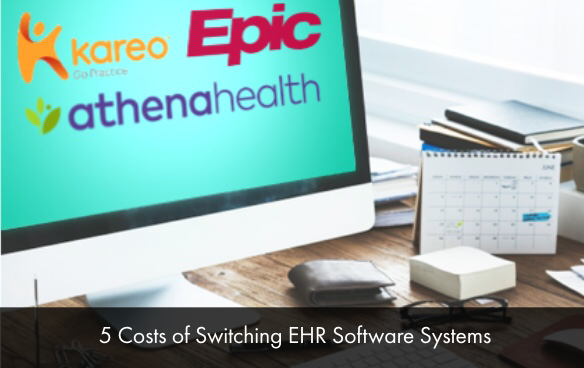Sometimes a healthcare provider may not be satisfied with his/her current EHR software system and may decide to switch to new and better EHR software solutions. The dissatisfaction may be due to less functionality from the current software and difficulty in using the software. A switch to a new Electronic Medical Records (EMR) Software may seem like a promising option in terms of better user interface and features that improve workflow efficiencies.
According to an article published in Medical Economics, there are significant costs associated with switching to a different Electronic Medical Records Software system. The costs include both hardware and software costs and these costs are usually higher than the anticipated costs by the practitioner. EHR expenses can rise if providers don’t make a wise decision when choosing a software system. To balance out the cost of EMR Software implementation the Medicare and Medicaid EHR Incentive Programs offer around $44,000 to $63,750 for each provider.
The Costs of switching EMR Software Solutions
Research and Negotiation Costs
These costs are realized even before the implementation of EHR software. Physicians have to research different Electronic Health Records Software vendors in the market. Then the next step involves staff members testing and reviewing EMRs to see the functionality they may offer to the medical practice.
Initial EHR Costs
In the first year of switching to a new EHR software system many costs add up these include, implementation, hardware, training, and software licensing costs.
Fees in the Software Contract
The software contract contains subscription fees, support fees, and maintenance fees. Experts also say you might have to pay a fee for a coding system. The contract furthermore mentions how much the fees will increase each year. Usually, a typical annual increase of 5% is charged to users which isn’t cheap.
Unexpected EHR Costs
Unexpected upgrade costs may be expensive. Regulatory standards keep changing which requires software updates. Hardware upgrades may be realized when the new EMR software might not work well with old printers, computers, and devices. Practices should also be prepared to pay for integration costs associated with the new EHR software these may include coding and insurance verification application fees.
Consulting Services
Some healthcare organizations may seek the services of professional consultants to help with negotiating the contract and to overall help with the EHR switch. These consultants charge about $2,500 and that too for early advice.
Conclusion
A practice may have an implementation plan. However, unanticipated costs will be incurred and the practice should be prepared to pay for the costs if they want an effective EHR software change. Cloud-based EHR software options are available which require minimum hardware requirements with automatic updates, this eventually turns out to be an affordable option for many healthcare organizations.







